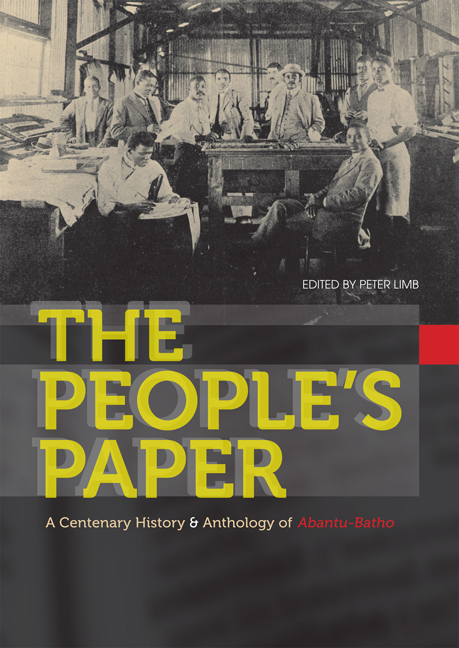Book contents
- Frontmatter
- Contents
- Contributors
- Acknowledgements
- Preface
- List of Abbreviations and Acronyms
- List of Illustrations
- PART I Essays
- Overview
- FOUNDERS AND EDITORS
- THEMES AND CONNECTIONS
- Chapter 6 The Swazi Royalty and the Founding of Abantu-Batho in a Regional Context
- Chapter 7 Abantu-Batho and the Xhosa Poets
- Chapter 8 African Royalty, Popular History and Abantu-Batho
- Chapter 9 ‘Johannesburg in Flames’: The 1918 Shilling Campaign, Abantu-Batho and Early African Nationalism in South Africa
- Chapter 10 Garveyism, Abantu-Batho and the Radicalisation of the African National Congress during the 1920s
- Chapter 11 An African Newspaper in Central Johannesburg: The Journalistic and Associational Context of Abantu-Batho
- Conclusion: Assessing the Decline and Legacy of Abantu-Batho
- PART II Anthology
Chapter 9 - ‘Johannesburg in Flames’: The 1918 Shilling Campaign, Abantu-Batho and Early African Nationalism in South Africa
from THEMES AND CONNECTIONS
Published online by Cambridge University Press: 21 April 2018
- Frontmatter
- Contents
- Contributors
- Acknowledgements
- Preface
- List of Abbreviations and Acronyms
- List of Illustrations
- PART I Essays
- Overview
- FOUNDERS AND EDITORS
- THEMES AND CONNECTIONS
- Chapter 6 The Swazi Royalty and the Founding of Abantu-Batho in a Regional Context
- Chapter 7 Abantu-Batho and the Xhosa Poets
- Chapter 8 African Royalty, Popular History and Abantu-Batho
- Chapter 9 ‘Johannesburg in Flames’: The 1918 Shilling Campaign, Abantu-Batho and Early African Nationalism in South Africa
- Chapter 10 Garveyism, Abantu-Batho and the Radicalisation of the African National Congress during the 1920s
- Chapter 11 An African Newspaper in Central Johannesburg: The Journalistic and Associational Context of Abantu-Batho
- Conclusion: Assessing the Decline and Legacy of Abantu-Batho
- PART II Anthology
Summary
In the 1910s, the period approaching a century ago, many urban working-class sectors across the world looked ready to explode. Johannesburg's post-World War I, early twentieth-century experience fits this pattern, although of course South Africa exhibited its own characteristic features. The commercialisation of agriculture propelled the old state–capitalist alliance to dispossess thousands of African peasants who had up to then clung to productive lands. They poured into South Africa's cities especially from Orange Free State ‘white farms’, alongside a smaller number of Afrikaner second and third sons, all looking for work. The government tried to manage the provision of their labour and cycled profits from gold mining back to white farm owners; and it legislated to keep Africans from leaving those farms too quickly. A cabinet secretary ruled collectively over Africans with a Native Affairs Department staffed by paternalist liberal administrators that dealt with chiefs and other purported representatives of Africans.
In and near South Africa's unreformed urban spaces, numbers of recently rural African youth pressed upon one another, kin and semi-kin. The African National Congress (ANC), officially called the South African Native National Congress (SANNC) until 1923, was then still a young organisation. It advocated for these men and their rural kin from the moment of its formation in 1912 as a protest against the exclusion of Africans from the franchise. The SANNC or ‘Congress’, as it was called, with its provincial affiliate the Transvaal Native Congress (TNC), raised great crowds toward the end of the 1910s under a capable leadership. These meetings on the Rand considered forming an alliance with white socialists in Johannesburg and drew Congress president S. M. Makgatho's direct intervention. Even more, for a few days in the winter of 1918 Congress appeared to verge on a new status, a possible vehicle for mass militant action. And yet this did not quite happen; or, certainly not with the ferocity of popular actions familiar to news watchers at the start of the twenty-first century.
- Type
- Chapter
- Information
- The People’s PaperA Centenary History & Anthology of Abantu-Batho, pp. 255 - 281Publisher: Wits University PressPrint publication year: 2012



